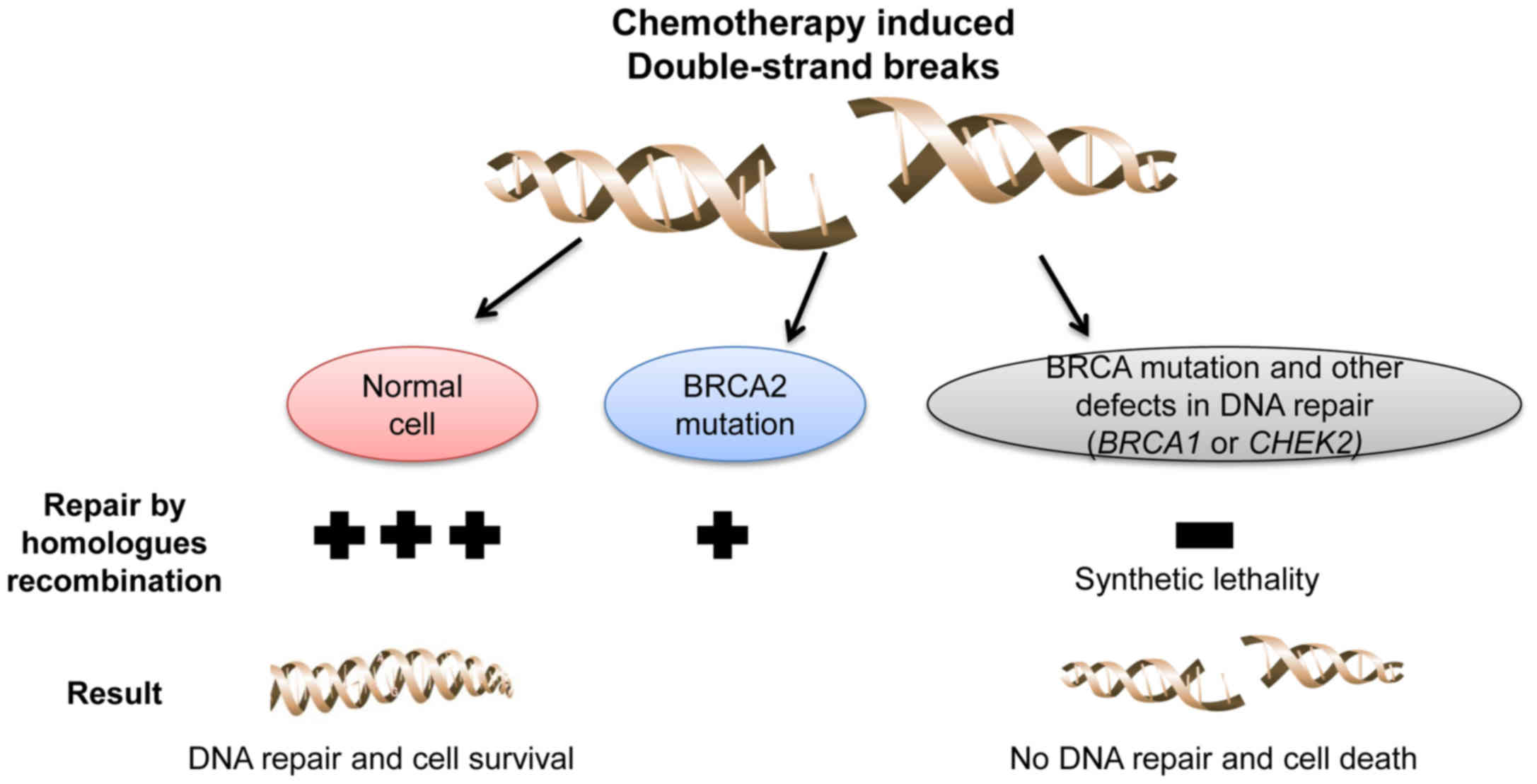|
1
|
Gresham GK, Wells GA, Gill S, Cameron C
and Jonker DJ: Chemotherapy regimens for advanced pancreatic
cancer: A systematic review and network meta-analysis. BMC Cancer.
14:4712014. View Article : Google Scholar : PubMed/NCBI
|
|
2
|
Heinemann V, Haas M and Boeck S: Systemic
treatment of advanced pancreatic cancer. Cancer Treat Rev.
38:843–853. 2012. View Article : Google Scholar : PubMed/NCBI
|
|
3
|
Roy R, Chun J and Powell SN: BRCA1 and
BRCA2: Different roles in a common pathway of genome protection.
Nat Rev Cancer. 12:68–78. 2011. View
Article : Google Scholar : PubMed/NCBI
|
|
4
|
Mavaddat N, Peock S, Frost D, Ellis S,
Platte R, Fineberg E, Evans DG, Izatt L, Eeles RA, Adlard J, et al:
Cancer risks for BRCA1 and BRCA2 mutation carriers: Results from
prospective analysis of EMBRACE. J Natl Cancer Inst. 105:812–822.
2013. View Article : Google Scholar : PubMed/NCBI
|
|
5
|
Hahn SA, Greenhalf B, Ellis I, Sina-Frey
M, Rieder H, Korte B, Gerdes B, Kress R, Ziegler A, Raeburn JA, et
al: BRCA2 germline mutations in familial pancreatic carcinoma. J
Natl Cancer Inst. 95:214–221. 2003. View Article : Google Scholar : PubMed/NCBI
|
|
6
|
Sonnenblick A, Kadouri L, Appelbaum L,
Peretz T, Sagi M, Goldberg Y and Hubert A: Complete remission, in
BRCA2 mutation carrier with metastatic pancreatic adenocarcinoma,
treated with cisplatin based therapy. Cancer Biol Ther. 12:165–168.
2011. View Article : Google Scholar : PubMed/NCBI
|
|
7
|
Lowery MA, Kelsen DP, Stadler ZK, Yu KH,
Janjigian YY, Ludwig E, D'Adamo DR, Salo-Mullen E, Robson ME, Allen
PJ, et al: An emerging entity: Pancreatic adenocarcinoma associated
with a known BRCA mutation: Clinical descriptors, treatment
implications and future directions. Oncologist. 16:1397–1402. 2011.
View Article : Google Scholar : PubMed/NCBI
|
|
8
|
Zick A, Peretz T, Lotem M, Hubert A, Katz
D, Temper M, Rottenberg Y, Uziely B, Nechushtan H, Meirovitz A, et
al: Treatment inferred from mutations identified using massive
parallel sequencing leads to clinical benefit in some heavily
pretreated cancer patients. Medicine (Baltimore). 96:e69312017.
View Article : Google Scholar : PubMed/NCBI
|
|
9
|
Muggia F, Safra T and Dubeau L: BRCA
genes: Lessons learned from experimental and clinical cancer. Ann
Oncol. 22 Suppl 1:i7–i10. 2011. View Article : Google Scholar : PubMed/NCBI
|
|
10
|
Sonnenblick A, de Azambuja E, Azim HA Jr
and Piccart M: An update on PARP inhibitors-moving to the adjuvant
setting. Nat Rev Clin Oncol. 12:27–41. 2015. View Article : Google Scholar : PubMed/NCBI
|
|
11
|
Silver DP, Richardson AL, Eklund AC, Wang
ZC, Szallasi Z, Li Q, Juul N, Leong CO, Calogrias D, Buraimoh A, et
al: Efficacy of neoadjuvant cisplatin in triple-negative breast
cancer. J Clin Oncol. 28:1145–1153. 2010. View Article : Google Scholar : PubMed/NCBI
|
|
12
|
Fong PC, Boss DS, Yap TA, Tutt A, Wu P,
Mergui-Roelvink M, Mortimer P, Swaisland H, Lau A, O'Connor MJ, et
al: Inhibition of Poly(ADP-Ribose) polymerase in tumors from BRCA
mutation carriers. N Engl J Med. 361:123–134. 2009. View Article : Google Scholar : PubMed/NCBI
|
|
13
|
Ledermann J, Harter P, Gourley C,
Friedlander M, Vergote I, Rustin G, Scott CL, Meier W,
Shapira-Frommer R, Safra T, et al: Olaparib maintenance therapy in
patients with platinum-sensitive relapsed serous ovarian cancer: A
preplanned retrospective analysis of outcomes by BRCA status in a
randomised phase 2 trial. Lancet Oncol. 15:852–861. 2014.
View Article : Google Scholar : PubMed/NCBI
|
|
14
|
Kwa M, Edwards S, Downey A, Reich E,
Wallach R, Curtin J and Muggia F: Ovarian cancer in BRCA mutation
carriers: Improved outcome after intraperitoneal (IP) cisplatin.
Ann Surg Oncol. 21:1468–1473. 2014. View Article : Google Scholar : PubMed/NCBI
|
|
15
|
Golan T, Kanji ZS, Epelbaum R, Devaud N,
Dagan E, Holter S, Aderka D, Paluch-Shimon S, Kaufman B,
Gershoni-Baruch R, et al: Overall survival and clinical
characteristics of pancreatic cancer in BRCA mutation carriers. Br
J Cancer. 111:1132–1138. 2014. View Article : Google Scholar : PubMed/NCBI
|
|
16
|
Fong PC, Yap TA, Boss DS, Carden CP,
Mergui-Roelvink M, Gourley C, De Greve J, Lubinski J, Shanley S,
Messiou C, et al: Poly(ADP)-ribose polymerase inhibition: frequent
durable responses in BRCA carrier ovarian cancer correlating with
platinum-free interval. J Clin Oncol. 28:2512–2519. 2010.
View Article : Google Scholar : PubMed/NCBI
|
|
17
|
Kaelin WG Jr: The concept of synthetic
lethality in the context of anticancer therapy. Nat Rev Cancer.
5:689–698. 2005. View
Article : Google Scholar : PubMed/NCBI
|
|
18
|
Farmer H, McCabe N, Lord CJ, Tutt AN,
Johnson DA, Richardson TB, Santarosa M, Dillon KJ, Hickson I,
Knights C, et al: Targeting the DNA repair defect in BRCA mutant
cells as a therapeutic strategy. Nature. 434:917–921. 2005.
View Article : Google Scholar : PubMed/NCBI
|
|
19
|
Bryant HE, Schultz N, Thomas HD, Parker
KM, Flower D, Lopez E, Kyle S, Meuth M, Curtin NJ and Helleday T:
Specific killing of BRCA2-deficient tumours with inhibitors of
poly(ADP-ribose) polymerase. Nature. 434:913–917. 2005. View Article : Google Scholar : PubMed/NCBI
|
|
20
|
Nevanlinna H and Bartek J: The CHEK2 gene
and inherited breast cancer susceptibility. Oncogene. 25:5912–5919.
2006. View Article : Google Scholar : PubMed/NCBI
|
|
21
|
Bartek J and Lukas J: Chk1 and Chk2
kinases in checkpoint control and cancer. Cancer Cell. 3:421–429.
2003. View Article : Google Scholar : PubMed/NCBI
|















